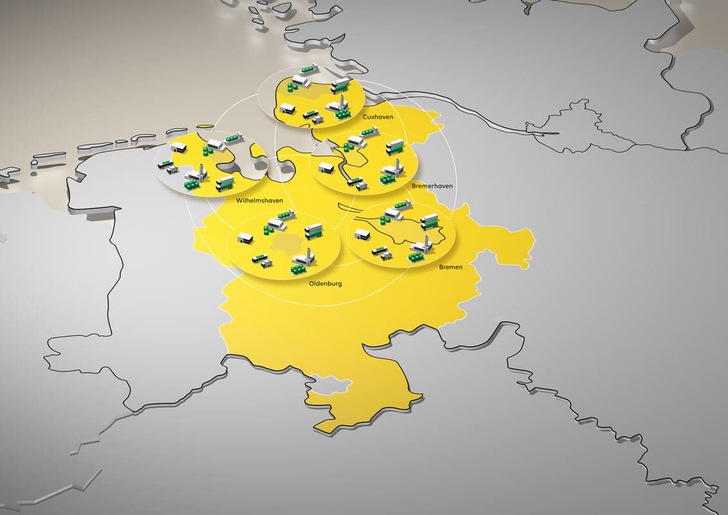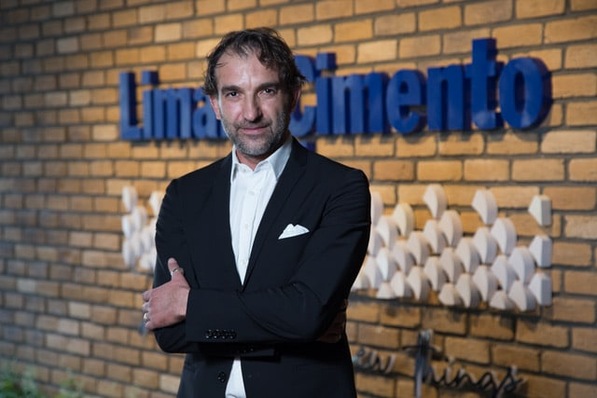The HyWays for Future project will boost efforts to ramp up renewable hydrogen production and use in northwestern Germany through a network of around 250 members. The aim of the initiative is to firmly embed sustainable hydrogen in the industry, energy supply and mobility sectors. Its initial focus will be on the deployment of hydrogen within transportation. As part of the project, investment will be channeled into various schemes, including the construction of hydrogen refueling stations, mobile storage, the procurement of hydrogen buses for local public transport, street sweepers and hydrogen-powered cars.
Hydrogen’s role as an energy carrier makes it a vital building block in the energy transition and northwestern Germany lends itself as a location for establishing a strong, sustainable hydrogen economy, in other words a veritable hydrogen hub. The focal point for this flagship hydrogen region is the Northwest Metropolitan Region which is home to the towns and cities of Cuxhaven, Wilhelmshaven, Bremerhaven, Oldenburg and Bremen.
National hydrogen hub
The HyWays area is well placed to become a leading region for hydrogen in the transport sector. Thanks to the high number of wind plants, situated both onshore and offshore, the electricity consumed here is already nearly 100 percent renewable. What’s more, the region offers caverns that are suitable for hydrogen storage and there are a wide range of possible outlets here for hydrogen use. Consequently a hydrogen economy will have enormous potential to create new added value in the region. It’s this favorable location and potential for development which the project is hoping to exploit.
HyWays for Future is founded upon two pillars: the implementation project and the innovation cluster.
HyFri – hydrogen buses for the Friesland district
The German district of Friesland is deploying hydrogen buses to enable zero-emission public transportation in some parts of its local network. The project, which will initially see five vehicles enter service, is designed to kick-start the expansion of the local hydrogen economy. The title HyFri, a contraction of Hydrogen and Friesland, underlines the project’s local roots and the regional nature of the value chain. The hydrogen buses, operated by regional bus company Weser-Ems-Bus, will pioneer the use of green hydrogen in the area. This is because of the potential to save vast amounts of carbon dioxide within the transportation sector.
Bus refueling will take place at a new hydrogen filling station which is to be conveniently situated in the town of Schortens. Operation of the refueling station will fall under the remit of a new operating company founded by the partners Weser-Ems-Bus, EWE and the Gödens Group. HyFri will be funded by the German transportation ministry as part of the HyWays for Future scheme.
The implementation project
The clearly communicated aim of the HyWays for Future initiative is to not only produce clean hydrogen locally with sustainable energy but to use it locally too. To make this happen, the implementation project plans to develop electrolyzer capacities and hydrogen refueling stations as well as invest in hydrogen vehicles.
Hydrogen production: HyWays for Future will rely on a variety of models for the manufacture of green hydrogen depending on local circumstances. Options include decentralized on-site production at refueling stations using small electrolyzers and large-scale centralized production, for example at industrial parks from which the hydrogen will then be transported to the filling stations.
Hydrogen refueling stations: Filling stations are vital facilities that underpin the use of hydrogen within the transportation sector. Up to five such refueling stations could be created in the flagship region as part of HyWays for Future. These stations will then form a network that will ensure widespread availability of hydrogen for fuel cell vehicles.
Fuel cell vehicles: Finally there are the zero-emission vehicles powered by green energy that will consume the hydrogen. The project foresees the purchase of buses, municipal vehicles such as street sweepers, and cars.
HY.City.Bremerhaven builds local green hydrogen infrastructure
A scheme in Bremerhaven will create a regional green hydrogen ecosystem from the end of 2022. To enable this vision, the company HY.City.Bremerhaven will build and operate an electrolyzer plant with a 2-megawatt capacity and a hydrogen refueling station located immediately adjacent to the service yard of Bremerhaven Bus. HY.City.Bremerhaven was established especially for this project by Bremerhaven startup Green Fuels, Bremerhaven Bus, construction service provider Georg Grube and tank logistics company UTG together with energy transition experts GP Joule. The project will construct a 2-megawatt electrolyzer and a public hydrogen refueling station for buses, trucks and cars. Funding for HY.City.Bremerhaven will come from the German transportation ministry as part of the HyWays for Future scheme.
The network within the innovation cluster
Parties involved in the innovation cluster will work together as part of a strong network of partners with the aim of turning the northwest into a leading hydrogen region. The goal is to gain mutual benefit from experiences across the entire value chain. Participants will go on a shared learning journey as the project unfolds. Concepts and initiatives relating to regional value creation will be devised, new funding projects launched and infrastructure and outlet markets developed. In short, the plan is to bring hydrogen into everyday life.
An exchange of ideas will be facilitated through participation in regular working group meetings. Discussions will center on four topics: Working Group 1 will deal with hydrogen for municipal vehicles and local public transport, Working Group 2 is tasked with freight transport and logistics, Working Group 3 will handle maritime applications and port logistics and Working Group 4 will concentrate on infrastructure and hydrogen provision. These working groups are public and all interested parties are invited to become involved.
The knowledge level of individual participants in the network varies widely, with some members dipping into the subject of hydrogen for the first while others are engaged in the local rollout of hydrogen. This is what makes the network so diverse and dynamic, with participants having the opportunity to learn and benefit from each other. The working groups will be led by representatives of major companies and institutions from the region, namely energy engineering consultancy PLANET, the Ems-Jade transport association, the city of Oldenburg, the Oldenburg Chamber of Industry and Commerce, Bremerhaven University of Applied Sciences, MARIKO, EWE NETZ and swb. The working groups currently have around 250 active members.
Oldenburg energy cluster
The energy cluster in Oldenburg known as OLEC is the largest cross-technology energy network in northwestern Germany. Its members have a comprehensive knowledge and a high level of expertise in the energy sector and are focused on renewable energies and how they can be integrated efficiently into future energy systems. OLEC brings together important regional stakeholders and acts as a discussion platform for the energy transition in Lower Saxony. It has also taken on the role of coordinating the energy cluster as part of the HyWays for Future project and is responsible for communication between working groups. OLEC organizes the working group meetings and workshops and helps to arrange network meetings.
The fifth working group, overseeing publicity and marketing, is not open to the public. It is directed by the Northwest Metropolitan Region and EWE and handles the project’s website. The working group has also produced films in the region and last year ran a creative contest.
Results
In addition to the HyLand grant, other pots of funding are available for the purposes of stimulating the market. These sources will be used to finance further vehicles and additional infrastructure, with a hydrogen refueling station in Oldenburg being one such example. HyWays for Future has already resulted in specific action; investments have been made and projects have been developed. The purchase of hydrogen buses in the Friesland district and the setting up of hydrogen infrastructure in Bremerhaven provide two illustrations of this. The continuously growing network of local stakeholders also has links to the initiatives of neighboring regions, giving a wider perspective. Next year, the network will grow further and stimulate rollout, laying the foundation for the development of sustainable hydrogen infrastructure in the northwest.
Energy company EWE is the consortium leader for the project and hence has the knowledge, infrastructure and transport networks to use and transmit the power generated from renewables for the purposes of electrolytic green hydrogen production. The HyWays for Future project, with its numerous partnering organizations, is one of the winners of the German transportation ministry’s ideas contest entitled “HyLand – Hydrogen regions in Germany.” Around EUR 90 million, including government funding, is due to be invested in the region over the coming years.
www.hyways-for-future.de
Author:
Silke Timmer
Oldenburger Energiecluster OLEC e.V., Oldenburg
silke.timmer@energiecluster.de




